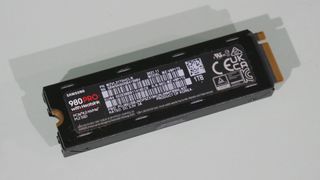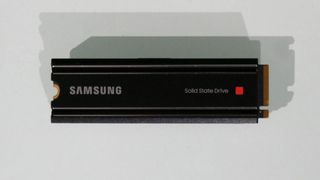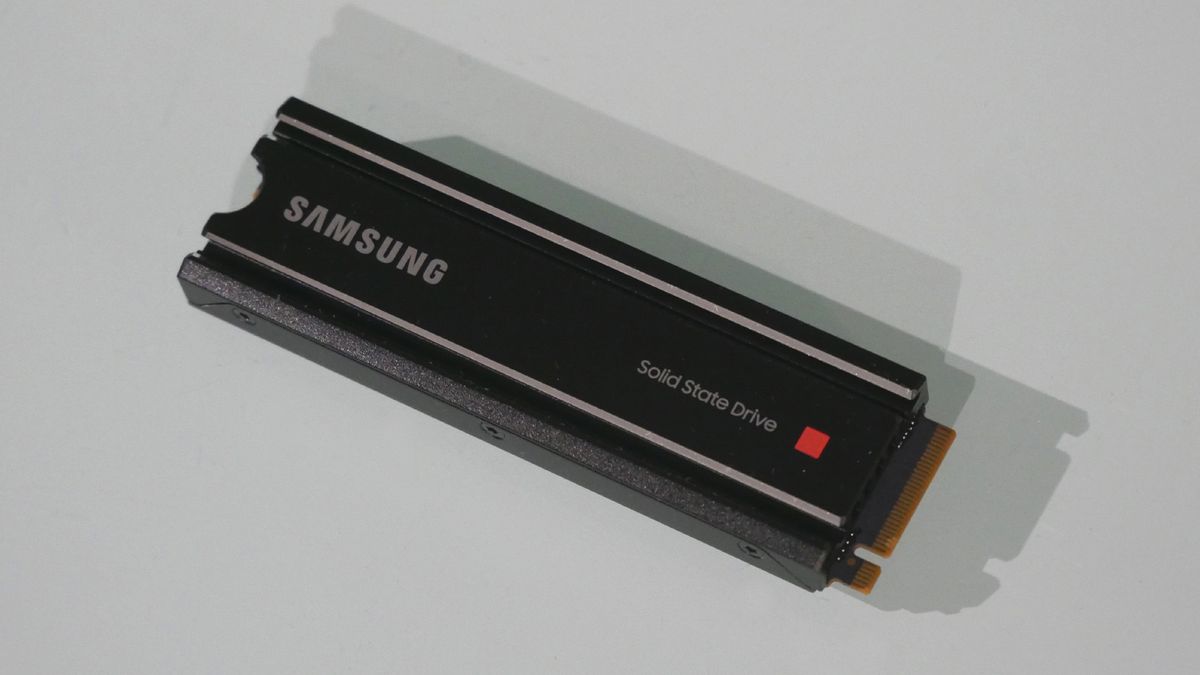12DOVE Verdict
Still a speedy SSD, but there are now faster, if pricier, options
Pros
- +
Competitive price
- +
Sony PS5-compatible
- +
Good all-round specs
Cons
- -
Mediocre 4K random write performance
- -
Stingy write endurance rating
Why you can trust 12DOVE
The Samsung 980 Pro is still right near the top and gold standard-level for PCIe Gen 4 contenders for best SSDs for gaming. Though it’s since been left slightly lagging by newer and faster drives, a new variant, the Samsung 980 Pro with Heatsink, fixes at least one obvious shortcoming. It’s now available with a factory-fitted heatsink that’s expressly designed to be Sony PS5 SSD.
Physically, it remains a standard M.2 2280 drive, of course. So, it’s just as compatible with a wide range of the best gaming PCs as ever. The heatsink is indeed removable, so you could even slot it into the best gaming laptops too which is neat. But, then, the regular 980 Pro is a bit cheaper and would make more sense for that kind of application.
Design & Features
The big change here is the heatsink. It increases the 980 Pro’s thickness to 8.5mm overall and is designed specifically to be compatible with the Sony PS5’s M.2 SSD slot. As with other standard M.2 2280 SSDs, the Samsung 980 Pro with Heatsink is not compatible with the Microsoft Xbox Series X. It’s also worth noting that many PC motherboards have M.2 cooling solutions that are only compatible with bare drives, which makes the slight price increase of this version of the 980 Pro rather redundant.
For the record, Samsung says the heatsink has been optimised using data centre technology to dissipate heat efficiently from its in-house controller chip, which is nickel coated. Available in 1TB and 2TB configurations, it’s the former we’re testing here.
That aside, there’s little to nothing new about the 980 Pro. In other words, what was once one of if not the most advanced M.2 SSDs has now been overtaken, both by the army of drives based on the Phison E18 controller, such as the Sabrent Rocket 4 Plus, the PNY XLR8 CS3140, the Kingston Fury Renegade and latterly the Seagate Firecuda 530 and by the likes of the WD Black SN850.

However, don’t go thinking that makes the Samsung 980 Pro irrelevant. For starters, it’s actually quite competitively priced now, especially compared to those Phison-based drives. And it’s also still a very well specced and quick SSD by any sane standard. It remains a PCIe Gen 4 drive with rated read and write speeds of 7GB/s and 5GB/s respectively, and it also comes with claimed 4K random performance of fully one million IOPs.
You also get 1GB of DDR4 cache, a five-year warranty, and, of course, Samsung’s own high-quality TLC NAND memory. Speaking of cache, one of the 980 Pro’s less impressive aspects in comparison to newer drives is the maximum 144GB of space allocated to operate in speedy SLC mode. That’s a lot less than many competing 1TB drives, which often allocate up to 300GB for SLC mode. This 1TB model's 600TB write endurance rating is also now looking off the pace, even if it’s likely to be much more than enough for most users.
Performance
This new variant of the Samsung 980 Pro inevitably differs little from the original in most aspects of performance. That means it’s a very quick SSD, but not as fast as the very latest PCIe 4.0 M.2 drives. In our testing, it tops out at around 6.7GB/s read and 4.9GB/’s writes in CystalDiskMark 7 were the fastest 1TB drives, including the WD Black SN850 and PNY XLR8 CS3140 can hit 7GB/s and 5.2GB/s, respectively.
If that’s not the sort of performance data you’re ever going to feel in the real world, the 980 Pro is further behind when it comes to 4K random access, particularly writes. Where the 980 Pro tops out at around 200MB/s, the WD BLACK SN850 is good for over 300MB/s. That’s quite a difference.
Our testing also confirmed that performance does indeed drop off after roughly 140GB of sustained writes, as you’d expect from the SLC cache allocation. As for operating temperatures, we registered a peak of 53 degrees C under load which bodies fairly well for longevity and also for use in the demanding environment that is the Sony PS5.

Overall - should you buy it?
Once the king of the SSD hill, the Samsung 980 Pro does remain fairly compelling, in part due to its competitive pricing. It’s no longer the fastest PCIe 4.0 drive you can buy, but we doubt you’d feel the difference, most of the time. And the addition of this Heatsink model will be welcome for Sony PS5 owners for sure.
On PC, this new variant is a little less compelling, especially when you factor in the mediocre 4K random write performance and the slightly stingy write endurance rating. But at the right price, and particularly if your motherboard lacks its own M.2 drive cooling, this new model could still be a top SSD in a performance gaming rig.
And if your search is more for something externally-shaped then check out our guides to the best external hard drives, best PS5 external hard drives, and best Xbox Series X external hard drives to cover your bases.
A serious dissertation on the finer points of input lag and overshoot followed by a forensic examination of AI-accelerated temporal upscaling. Such is a routine day in the working life of long-time tech wordsmith, Jeremy Laird. Along with GamesRadar, Jeremy’s 15-year back catalogue includes a host of tech and gaming outlets, including TechRadar and PC Gamer, not to mention contributions to mainstream media from the Independent to the Evening Standard. Complimenting Jeremy’s debilitating addiction to all kinds of digital hardware, he is also afflicted by an obsession with and a significant occupational sideline in cars and automotive technology.

Ahead of GTA 6, Take-Two CEO says he’s “not worried about AI creating hits” because it’s built on recycled data: “Big hits […] need to be created out of thin air”

Getting Over It creator Bennett Foddy threatens the world once again: If you want Baby Steps to be a brutal rage game, "you can inflict that on yourself"

A Simpsons Hit and Run Remake will probably never happen – and I don't want it to












